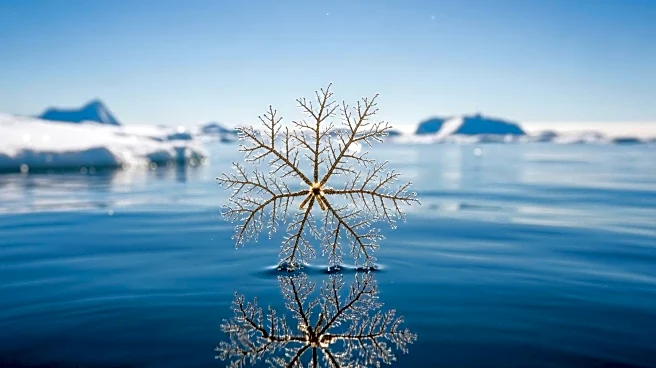What is the story about?
What's Happening?
Researchers have identified a turquoise patch in the Antarctic Ocean, visible in satellite images, which is home to coccolithophores, tiny marine organisms previously thought unable to survive in cold waters. This discovery challenges previous assumptions about marine life in extreme conditions and reveals a dynamic interaction between coccolithophores and diatoms, impacting the ocean's carbon cycle. The study, published in Global Biogeochemical Cycles, suggests new potential for plankton in combating climate change by sequestering atmospheric carbon. The findings provide a new perspective on the distribution of coccolithophores and their role in the carbon cycle.
Why It's Important?
The presence of coccolithophores in unexpected areas has significant implications for global carbon cycles. These organisms are vital carbon sinks, absorbing atmospheric carbon dioxide and helping mitigate climate change effects. The study's findings expand our knowledge of where coccolithophores thrive, suggesting that their carbon-absorbing capabilities might be more extensive than previously thought. Understanding these patterns is crucial for predicting how marine ecosystems will respond to environmental changes, making this research pertinent as climate change continues to alter oceanic conditions.
What's Next?
The discovery opens new avenues for research, with scientists tasked with exploring how coccolithophores adapt to cold environments and what factors influence their distribution. Further studies could reveal more about the ecological interactions between coccolithophores and diatoms, providing a deeper understanding of their roles in marine ecosystems. Additionally, the study raises questions about the potential for using plankton to combat climate change, with scientists investigating ways to enhance plankton growth to increase carbon absorption from the atmosphere.
Beyond the Headlines
The Antarctic Ocean's turquoise mystery offers a fascinating glimpse into the intricacies of marine life and its impact on global processes. As scientists continue to investigate these phenomena, the ocean may reveal more secrets about our planet's future, highlighting the importance of comprehensive data collection and interdisciplinary research in understanding and addressing climate change.
















